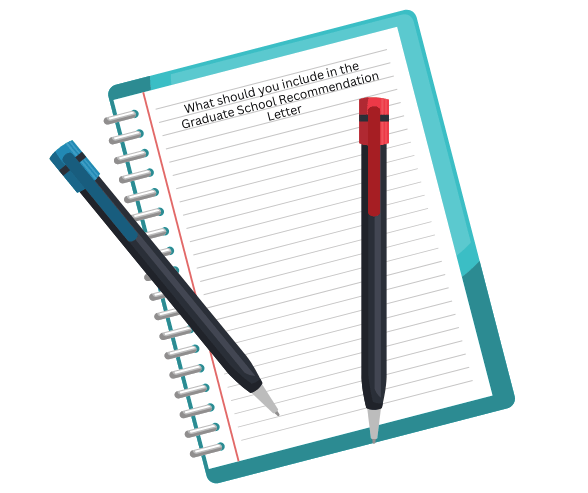Writing a letter of recommendation for graduate school stands as one of the most impactful tasks you can perform for a student’s academic future.
Your role as a professor, employer, or mentor places you in a unique position to influence admissions decisions through your written endorsement. The weight of your words can open doors to prestigious programs and shape career paths.
This guide provides practical steps to create powerful recommendation letters that showcase student strengths, highlight achievements, and effectively demonstrate graduate-level potential.
TL;DR: How To Write A Letter Of Recommendation For Graduate School
To write an effective graduate school recommendation letter:
- Start with a strong opening, stating your relationship with the applicant.
- Highlight specific examples of the student’s achievements and skills.
- Address the applicant’s potential for graduate-level work.
- Be honest and enthusiastic, but avoid exaggeration.
- Close with a clear endorsement and offer to provide further information if needed.
What Is a Graduate School Recommendation Letter?
A graduate school recommendation letter is a document that should be written by someone who knows the applicant well. These may include a professor, boss, or colleague.
Its purpose is to support the applicant’s application to a graduate program, such as a master’s or doctoral program.

The Recommendation letter gives insight into the applicant’s qualifications, accomplishments, and personal qualities. This would help nurture and build a suitable candidate for graduate studies.
The letter usually includes specific details about how the recommender knows the applicant, like how long they’ve known each other and in what capacity.
Additionally, the recommendation letter often highlights the applicant’s personal qualities, like motivation, dedication, leadership potential, ability to work in a team, and other characteristics relevant to their desired field of study.
What should you include in the Graduate School Recommendation Letter?
When writing a graduate school recommendation letter, it is important to include specific information, including the applicant’s qualifications and potential.

Let’s have a look at the key elements to include in the recommendation letter.
- Your relationship with the student. How did you meet the student? What is your role in their academic or professional life?
- The student’s academic achievements. What are their grades, GPA, and test scores? What courses have they excelled in?
- The student’s research experience. If the student has any research experience, be sure to discuss their skills and contributions.
- The student’s extracurricular activities. What are the student’s interests outside of the classroom? How do their extracurricular activities demonstrate their leadership, teamwork, and communication skills?
- The student’s personal qualities. What are the student’s strengths and weaknesses? What are their values and goals?
- Your overall assessment of the student. Why do you believe the student would be a good fit for the graduate program? What are their strengths, and why would they be successful in the program?
How to Write a Letter of Recommendation for Graduate School?
Now, here is a step-by-step outline that you can use to compose an effective letter of recommendation.

1. Greeting to the recipient:
Begin your letter with a polite and professional greeting. Address the recipient by their appropriate title, such as “Dear Admissions Committee” or “To Whom It May Concern.”
2. Opening paragraph:
In the opening paragraph, provide a brief introduction that establishes your position and relationship to the applicant. State your professional or academic connection with the applicant and briefly mention the length and nature of your association.
Give a general assessment of the applicant’s qualifications and potential for success in graduate school.
3. Second paragraph:
Focus on highlighting a specific positive skill or trait of the applicant in each subsequent paragraph.
Start by identifying a particular skill or trait relevant to the applicant’s intended program of study. Provide evidence of this trait or skill by citing specific achievements, accomplishments, or projects the applicant has undertaken.
4. Third (up to fifth) paragraph:
Continue highlighting additional skills or traits of the applicant in subsequent paragraphs. Choose qualities that are relevant to the applicant’s desired program or field of study.
You can also provide detailed evidence of the applicant’s character and skills by citing specific instances or projects where they displayed these traits.
5. Final Paragraph:
In the final paragraph, summarize your recommendation and explicitly state your endorsement of the applicant for the specific graduate school or program they are applying to.
Here you can highlight their unique qualifications and express your confidence in their ability to thrive in the program.
6. Closing line:
End the letter with a professional closing, such as “Sincerely” or “Best regards.” Sign your name beneath the closing and print your name below your signature for added clarity.
By following this detailed outline, you can effectively structure your letter of recommendation for graduate school. Remember to personalize each paragraph to highlight the applicant’s unique qualities, skills, and experiences.
Sample Recommendation Letter
To help you understand better, here is an example of a well-written graduate school recommendation letter.
Your Name]
[Your Position/Title]
[Your Organization]
[Address]
[City, State, ZIP Code]
[Email Address]
[Phone Number]
[Date]
[Graduate School Admissions Committee]
[Graduate School Name]
[Address]
[City, State, ZIP Code]
Subject: Letter of Recommendation for [Applicant’s Full Name]
Dear [Admissions Committee],
I am writing to highly recommend [Applicant’s Full Name] for admission to [Graduate School Name] in [Program/Major].
I have had the privilege of working closely with [Applicant’s Name] for [duration of your professional relationship] in their capacity as [current or previous position/title] at [organization/school].
We have been consistently impressed with [his/her] intelligence, dedication, and remarkable academic abilities, which make [him/her] an ideal candidate for your esteemed graduate program.
What sets [Applicant’s Name] apart is [his/her] exceptional analytical skills and intellectual curiosity. [His/Her] research capabilities are outstanding, as evidenced by [specific examples of research projects, thesis, publications, or presentations].
In addition to [his/her] strong academic performance, [Applicant’s Name] is an outstanding communicator and collaborator.
Based on my extensive experience working with [Applicant’s Name], I have no doubt that [he/she] possesses the intellectual capacity, perseverance, and dedication necessary to excel in your rigorous graduate program.
In conclusion, I wholeheartedly recommend [Applicant’s Full Name] for admission to [Graduate School Name] without any reservations. I am confident that [he/she] will thrive in your academic environment and contribute positively
If you require any further information or have any questions, please do not hesitate to contact me. Thank you for considering the application of [Applicant’s Full Name].
I have no doubt that [he/she] will excel in [Graduate School Name] and contribute positively to the academic community.
Sincerely,
[Your Name]
[Your Position/Title]
[Your Organization]
Common Mistakes To Avoid In Graduate School Recommendations
Many recommenders make the following errors that weaken their letters. Check it out so you don’t make the same mistakes again.
- Generic letters without specific examples reduce your recommendation’s impact and credibility.
- Focusing only on grades ignores important personal qualities and research potential.
- Writing overly brief letters suggests a lack of genuine knowledge about the student.
- Using vague praise like “good student” fails to distinguish the applicant effectively.
- Submitting letters late can disqualify students from their desired graduate programs.
- Exaggerating achievements creates unrealistic expectations and damages your professional reputation completely.
- Ignoring program requirements means missing key qualities that admissions committees seek.
Final Verdict: Check Free Letter Of Recommendation For Graduate School
I have shared some of the most valuable information on writing a recommendation letter.
Understand that creating a graduate school recommendation letter demands attention to detail and genuine insight into the applicant’s abilities.
Focus on specific examples, maintain honesty throughout your assessment, and structure your letter logically from introduction to final part. Your thoughtful evaluation can become the deciding factor in an applicant’s acceptance.
Take time to personalize each letter, reflect on the student’s unique qualities, and provide evidence of their potential for success in graduate studies.
Related read:
- How To Write A Letter Of Intent For Graduate School
- How To Write A Statement Of Purpose For Graduate School
- How Many College Credits Do You Need To Graduate
FAQs: Letter of Recommendation for Graduate School
When requesting a letter of recommendation, you should make your request in person or with a polite and professional email. You must provide your relevant information, like a resume, statement of purpose, and specific guidelines or requirements, to your recommender.
The length of the recommendation letter may vary; a typical letter of recommendation for graduate school is usually one to two pages.
You can follow any specific formatting or submission guidelines provided by the graduate school or program. This may include a particular letterhead, submitting the letter through an online application portal, or mailing a physical copy.

